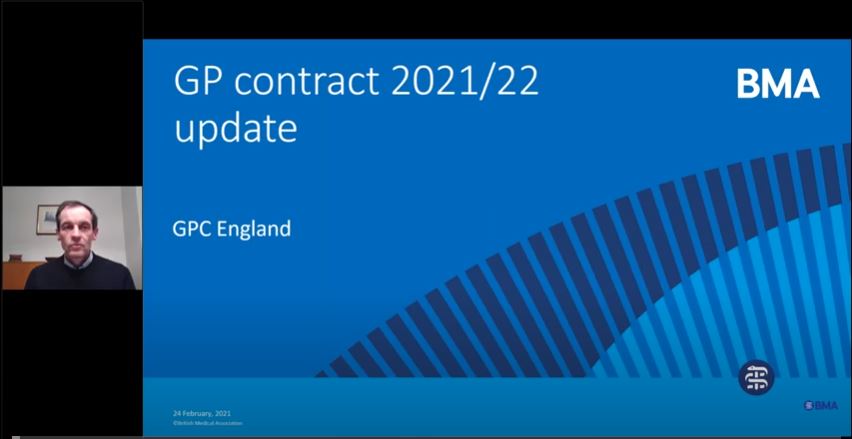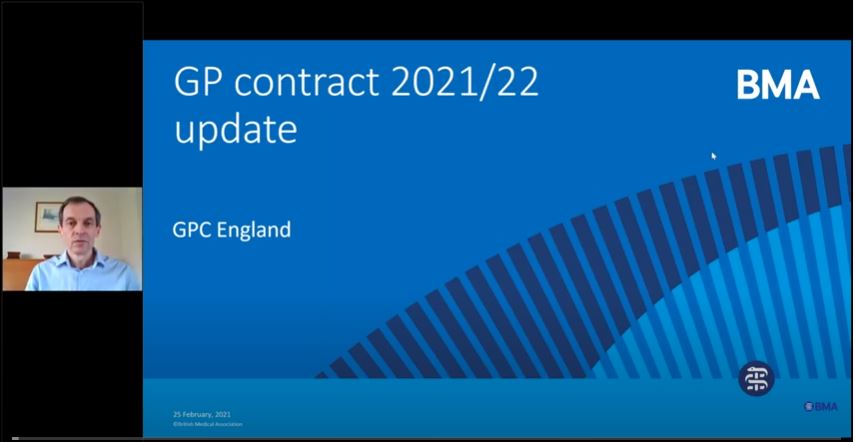Top-line changes
- Minimal changes from 1 April 2021, including delays to previously agreed elements. Where they relate to the GMS and PMS contracts, the changes will come into effect upon amendment of the contract regulations.
- Funding commitments already made will be honoured (GP contract uplifts, IIF and ARRS uplifts etc).
- Changes are to assist with the pandemic and its impact.
- Arrangements will remain under review, depending on the progression of the pandemic and the progress of the Covid vaccination programme, and further changes will be agreed between NHS England and GPC England in year (with reasonable notice provided to practices).
- QOF will be based on the indicator set from 20/21, with limited changes.
- Global sum will increase by £3.32 (3.5%) to £96.78
- QOF point value will increase by £6.33 (3.3%) to £201.16
- Out of hours adjustment will increase by £0.14 (3.0%) to £4.59
The contract
Full details on all of the aspects of the deal are included in this letter to the profession, produced jointly between GPC England and NHS England. Further guidance will be published in due course.


Global sum figures have been recalculated since these webinars. The updated figures are included in the presentation below.
Practice contract and GPs
As per the five year deal, practices will receive an uplift to global sum to allow for a 2.1% pay and expenses increase, for population growth, and for additional S7a funding for vaccinations and immunisations. This will be at a time when there will be wider public sector pay restraint/freezes.
NHSE/I will undertake a data collection survey in general practice to get an accurate baseline of current terms and conditions of practice staff, in order to inform the development of good practice guidance on employment terms and conditions; and explore how general practice gender pay gap information can be made more transparent in a way which respects individual privacy and does not result in undue additional burdens upon practices, with a view to agreement and implementation during 2021/22.
The cervical screening additional service will become an essential service.
The removal of the requirement for patient consent in use of eRD made under the pandemic regulations will become a permanent change.
A contractual requirement for a more timely transfer of patient records when patients move between practices will be introduced.
Changes will clarify that digital services are allowed to be delivered by contractors through locations other than practice premises, in line with current practice.
Minor updates will be made to the existing Structured Medication Review and Early Cancer Diagnosis services within the Network Contract DES from April 2021.
PCN DES overview
Previously agreed changes that will continue as planned
- ARRS increase in funding (£430m in 2020/21 to £746 in 2021/22).
- Expansion of ARRS roles (additional roles agreed in October 2020 to continue, and paramedics, AHPs and MHPs to commence from April 2021).
- IIF increase in funding (to £150m in 21/22, with at least £30m to incentivise access).
Previously agreed changes to be delayed
- Additional four service specifications will not be introduced from April 2021, given reprioritisation necessitated by the pandemic.
- More phased approach to the introduction of new IIF indicators for 21/22 (exact indicators and dates to be agreed).
- Access offer to be developed over summer 2021, and implemented from April 22.
New changes agreed
- CP transfer from the Clinical Pharmacist in General Practice scheme allowed from 1 April to 30 Sept 21.
- London weighting for ARRS.
- PCNs will be entitled to an embedded mental health practitioner, employed and provided as a service by the PCN’s local provider of community mental health services, funded under a local agreement; 50% of the funding will be provided from the mental health provider and 50% by the PCN.
Inner and outer London weighting
For PCNs in the London region, the maximum reimbursement amounts per role within the ARRS will now include inner and outer London weighting on top of maximum current ARRS reimbursement amounts.
For 2021/22, this will be reinforced through the Network Contract DES and will not mean an increase to ARRS funding for London or a reduction in ARRS allocations outside London.
Updating QOF
QOF will be based on the indicator set from 20/21, with limited changes which support the impact of the pandemic for some key areas:
- V&I changes are being implemented to continue the changes previously agreed: four indicators have been agreed to comprise the new V&I domain, transferring almost £60m from the Childhood Immunisations DES to QOF increasing the total value of QOF
- a further £24m into QOF from April, transferred from mental health funding to strengthen the SMI physical health check indicator set and support uptake
- revised indicator wording for CAN003 and introducing a new cancer indicator.
Learning Disabilities and Supporting Early Cancer Diagnosis QI modules for 21/22 will be a repeat of (with slight modification to account for the impact of the pandemic upon care).
Remote working when clinically necessary will continue to be an acceptable way of delivering QOF reviews.
Enhanced service on obesity and weight management
Given the significant focus of the pandemic on obesity and weight management, GPC has agreed to discuss the introduction of a new enhanced service.
The aim is to introduce new measures to tackle obesity during 2021/22, supported by additional funding from government.
Details are still to be agreed between GPCE and NHSEI.
Staff terms and conditions
We have agreed to develop good practice guidance on employment terms and conditions in general practice, to publish in year.
This will be informed by a data collection survey to get an accurate baseline of current terms and conditions of practice staff. We will explore how general practice gender pay gap information can be made more transparent in a way which respects individual privacy and does not result in undue additional burdens upon practices, with a view to agreement and implementation in year.
Core digital offer
The five year deal included a commitment for a core digital offer that practices will be required to make to their patients. Largely based on the new ways of working during the pandemic, we have agreed that practices will be required to offer:
- online consultations that can be used by patients, carers and by practice staff on a patient’s behalf, to gather submitted structured information and to support triage, enabling the practice to allocate patients to the right service for their needs.
- the ability to hold a video consultation between patients, carers and clinicians
- two-way secure written communication between patients, carers and practices
- an up to date accessible online presence, such as a website, that, amongst other key information, links to online consultation system and other online services prominently
- signposting to a validated symptom checker and self-care health information (e.g. nhs.uk) via the practice’s online presence and other communications
- shared record access, including patients being able to add to their record
- request and management of prescriptions online
- online appointment booking.
As with other changes to GMS and PMS contracts, the exact requirements will come into effect upon amendment of the contract regulations, and practices will be notified when this happens.
Practices will need to install online and video consultation tools and use them ordinarily, the tools and functionality will the responsibility of the CCG.
The current arrangement for practices which have implemented and operate a ‘total-triage’ / ‘triage-first’ model do not have to meet the 25% online booking contract requirement, will be extended.
Practices will provide for patients to use an online method to inform their practice of a change of address, contact details or of their demographic information.

